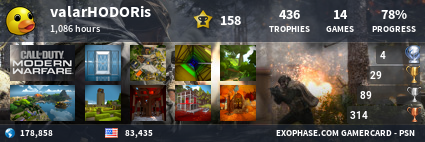Death as a Consequence
This topic seems somewhat appropriate considering Bloodborne just came out.
Desynchronization as a concept seems perfect for giving more incentive to avoid death. It could cause you to lose some money (not all of it like in Souls) or give you a lower reward for a mission if you die multiple times while completing it. (it would make perfect sense for "full sync" to only refer to not dying)
I personally would love if it were tied into something I've talked about before: the overarching system representing the low-level Assassin vs. Templar conflict. So desynching would mean that the templars will automatically regain some amount of the control you've taken from them. Similar again to Shadow of Mordor, where the Orc hierarchy moves forward when you die.
Obviously it shouldn't be too punishing, since this series is meant to be accessible. But it would be interesting if the concept of the simulation beginning to break down were represented tangibly, rather than solely in a jittery load screen.
Do any of you have some ideas for consequences that could happen as a result of dying/desynching?
I don't know, but I love your signature.
"Right lovely day in jolly ol' France, eh me guvnah?"
This is nice. "It would make perfect sense for "full sync" to only refer to not dying," reflects the way AC1 grounded all of its story and gameplay in its universe perfectly. Synchronization is the state of being exactly in Sync with an ancestor. So the consequences for Desyncing should have much to do with the concepts of both Loss of Synchronization (being "off beat") or Disruption.
Ideas:
- Being able to [Restore Full Synchronization] with what you've lost. This would probably always end up on top of a tall building not used as a Viewpoint. You wouldn't be able to Fast Travel right to it.
- When you re-enter the area you Desynchronized in, it first appears as a frozen instance of the moment before your death. As you explore it further, more of the simulation unfreezes or "skips forward" to its current/accurate state.
- Your next "dive" into the Animus being [Unstable.] Similar to how Souls removes your Max HP. AC shouldn't do it to such an extent (as you say, it's meant to be accessible) but that could be interesting. The bottom of your Sync Bar might flicker, and if enough damage is taken that Sync reaches the glitched area you would Desync again. No further Sync Bar penalty on this.
- Losing a purchased Weapon or Upgrade. AC has a "one-shot" economy. The first time you buy something is the only time you will. This will change that, if the Weapon or Upgrade in question is important to the player. This might be extreme - so if used, the player should clearly be told what will be [Lost On Desync.]
- Loss of Eagle Vision until Full Synchronization is Restored.
Finally, while a player should be able to Restore Full Synchronization manually by moving to the location their Data was dropped in, it should also restore by itself extremely slowly, over time. Over maybe half an hour, the player will gain back all their Max HP, their Weapons, and eventually their Eagle Vision (last). This fits with the theme of the player "living" as the Assassin for long enough that they feel more in Sync. It's how AC1 did it, and it makes sense. This would be a more evolved way of limiting Eagle Vision than the way AC1 did it.
You would be able to use Vision even at less than Full Health, but NOT if you're at less than full MAX Health.
[Note: Final Fantasy XV has some nice mechanics that deal with Health versus Max Health.]
@Joey, I'm a very funny man.
@DAZ
I'm not sure I think the "get to the spot you died" mechanic would fit AC as well as it does a Souls game. In those games, the environment is meant to be a challenge in and of itself, and almost every single bit of them is a very finely tuned challenge that the player must overcome. In AC, however, navigation is meant to be effortless, and the environment your ally. Getting to a spot without dying is rarely difficult, because you can lead enemies off and come back later, or simply move too fast for them. Generally you die when you are cornered in an area with no easy escape route, no distraction items, and too many enemies to take on at once.
In a souls game, you have very few meaningful tools besides health items and some ranged weapons, and enemies rarely wander very far from where they spawned. So coming back to a spot with everything refilled will likely mean you'll face the exact same level of challenge. In the example of AC, you probably were chased by enemies for a bit, and you probably died because a bunch of them came from far away to help out your friends. If you come back and the enemies are back in their old patterns, it's possible that the place where you died is out of reach of any of them, or only a few actually spawned close enough to be an issue.
All of this combined with the only reward being the removal of a temporary health decrease starts to make it seem less meaningful and more like busywork. I'd say the same of the idea for climbing a tower to have the same effect. Unless the mechanics change drastically, that won't be a huge challenge, and it would kill motivation to go do it the hard but more potentially interesting way.
I do think, however, that the concept of the animus being "unstable" could work on its own. Instead of the lost health slowly replenishing over time (which could motivate standing around waiting for it to be back to full) I think it should given back fully for killing your target or finishing a mission, a lot for completing objectives while incognito, a little for silent takedowns, and the smallest amount for kills during open conflict. I agree that it should only decrease one level, although it should go back to the full penalty if there's any amount left on your bar when you die. I won't suggest a percentage that the penalty should be, as that's more something a combat designer would have to answer, as they'd have to balance the game to be played at all levels of health.
Losing a weapon is interesting... but I feel like that's getting into territory that isn't right for AC. It's a mechanic that seems a bit too hardcore, even if you could regain said weapon. My thinking is that the objective of the consequence should be to make players value playing more stealthily and carefully, but I don't want to heavily punish people who want to only solve things through combat. Less health means they have to be careful, no weapon means they have no choice. If it were a debuff where you you do less damage in combat because your weapons are desynched, that might be fine, but I feel like it would impact the feel of combat in a much more complicated and potentially unsatisfying way than less health, since having less health makes fights tenser, and doing less damage makes them longer.
Losing Eagle Vision seems to me like something that would lead to Eagle Vision becoming sidelined and less interesting. It seems from the Victory screenshot that they might be tying it to its own unique resource, so complicating it again would probably step on that. And just in general I think Unity's version of Eagle Vision is really great for making stealth both accessible for new players and empowering for old ones, so it would be a shame if people got to use it less, and thus might be less interested in stealthy play. (something I'd like to avoid)
EDIT: Re: FF XV, are you referring to the mechanic where resting at a campsite gives you a temporary max health buff and cashes in your experience points? Either of those seem like they would work perfectly with AC: Bureaus could return and be a place that players want to check in at every once in a while! One of the things that bothered me about Unity, but has been a problem with the series in general, is that there's never really a sense that you have any reason to visit your home base unless there's a mission starting there. You have to go to the cafe to get your money, but that's not really the REAL Assassin HQ, and it's not fun to have to drop everything and go there. So giving players reasons to check in with the Order, but also making those check-in locations conveniently placed? That'd be neat!
Yeah, that's basically what I was talking about in terms of FFXV.
Some very solid points, and fantastic refinement of the "raw" ideas I tossed down.
I don't see the harm in having the Sync Bar glitch resolve itself very slowly. It should be slow enough that on its own it does not feel like a reliable method of resolving it, but it's still a very small bonus over the course of an hour. The reason I'd still like is that while those suggestions are very good, all of those involve either eliminating enemies, or completing a mission. If the player's running around in the open world - and especially post-game - and wants to avoid killing stuff and be truly stealthy, I'd at least allow that to be some kind of option. It's not that big of a deal though, either way.
We can gut everything that feels like it won't work.
I'll throw in another sort of suggestion in terms of the Bureaus below.
So Updated;
- Unstable Synchronization: Desynchronizing causes a Sync Bar glitch, leading to less survivability. The glitch can be removed slightly or greatly through Combat Kills, Stealth Kills, Completing Objectives Anonymously, Assassinating a Target, or Completing a Memory.
- Brotherhood Intelligence: Visiting a Bureau during the current Day/Night phase allows Eagle Vision to mark a wider variety of objects and people in the surrounding environment. Guards and patrol routes may become visible on the Map Screen. Being more in Sync with the Assassin's current state allows for a slightly enhanced Sync Bar.
Can you guys just start a game company already? 
There's so many good ideas in your heads!
@gerund If good ideas were all it took to make a game and sell it, I'd be rich!
@DAZ, the way I envision it, systemic events would count as objectives/targets, and so the player would be encouraged to go engage with them without them having to be so aggressively spawned. But what you say does make sense: the pace in the open world does is generally more leisurely. I feel like a compromise could be met, with the regeneration only happening when you're not engaged in a mission?
I approve of your redefinition of "unstable", and "brotherhood intelligence" as you describe it seems really interesting! I especially appreciate the idea of the map becoming a more tactical utility, which I feel like only AC1 ever really tried to do, and not very successfully. Unity's 3D map was so close to being really useful for that, and I imagine they intended it to be at one point. All that it would really need is a closer zoom and data visualization, since it already tracks object heights and positions in real-time. Obviously map data couldn't be too specific about EVERY guard/hazard, but listing their general paths and approximate locations would be enough to highlight the weak points.
@Calvar the Blade, this actually makes a lot of sense. If they absolutely must be in the game, your method is a good way of going about it. In Unity you'd be navigating and their icons would suddenly appear in your field of vision, oftentimes very close to you and along your current path anyway. Regeneration happening only when you're not in a Mission is a good way to do this, agreed.
About the map being able to track guards exactly; it's true that may be too much. That should stay out. Or, if it's ever in, it should be a special treat for the most rare occasions, justified by some kind of Eagle Vision improvement or other. Just please, no tying it to clothes xD
@Calvar the Blade, this actually makes a lot of sense. If they absolutely must be in the game, your method is a good way of going about it. In Unity you'd be navigating and their icons would suddenly appear in your field of vision, oftentimes very close to you and along your current path anyway. Regeneration happening only when you're not in a Mission is a good way to do this, agreed.
About the map being able to track guards exactly; it's true that may be too much. That should stay out. Or, if it's ever in, it should be a special treat for the most rare occasions, justified by some kind of Eagle Vision improvement or other. Just please, no tying it to clothes xD
Yeah, I think there should be a more sensible separation of abilities that are inherent and ones that are affected by equipment.
I just thought of something else.
Souls and Bloodborne allow players to leave messages for each other in a sort of asynchronous multiplayer experience.
Assassin's Creed could easily do that both with mechanics and with mythos. The same kind of "Fair" or "Foul" voting system (though maybe with different names) could make sure messages carry their reputation on their sleeves, so players can know if something is genuine, or trolling.
I just thought of something else.
Souls and Bloodborne allow players to leave messages for each other in a sort of asynchronous multiplayer experience.
Assassin's Creed could easily do that both with mechanics and with mythos. The same kind of "Fair" or "Foul" voting system (though maybe with different names) could make sure messages carry their reputation on their sleeves, so players can know if something is genuine, or trolling.
Excellent point.
I just thought of something else.
Souls and Bloodborne allow players to leave messages for each other in a sort of asynchronous multiplayer experience.
Assassin's Creed could easily do that both with mechanics and with mythos. The same kind of "Fair" or "Foul" voting system (though maybe with different names) could make sure messages carry their reputation on their sleeves, so players can know if something is genuine, or trolling.
I could have fun with that. 
I feel like the message system works in Bloodborne/Souls because they're games that are constantly trying to trick you or hide the correct course of action from you, and the messages basically act as a way for the players to band together against the developers. Meanwhile Assassin's Creed gives every player X-ray vision and you'll never encounter a chest that tries to eat you. Would it be useful for folks like most of THB, who try to deconstruct levels and pull off specific and really tricky things? Yup. Would it be useful to the average player trying to get through? Not very much. But it is useful to the average player in souls games, which is why it's in there.
Such a feature might seem inoffensive, but they have far more pressing issues in both their online and offline experience to solve. And I also feel like it would be difficult to make it fit in the world without resorting to an animus "glitch" effect, the likes of which should be used more sparingly and subtly.
I think the "ghost" aspect of the souls stuff would fit best in time trials/races, and Unity did a really good job of that, though I think enabling the ghost should detract from your score. Less necessary in other missions/free roam since, after all, the games are about choosing your own path, and rarely demand you learn one hyper-specific way of completing an objective. (and we complain when they do)
You're right, that makes sense. In terms of effect on the average player, it's practically negligible. And with games like Assassin's Creed, I can kind of see people resorting to using it purely to troll, as opposed to Souls and Bloodborne where assistance and solidarity of some kind is practically necessary.
You're right, that makes sense. In terms of effect on the average player, it's practically negligible. And with games like Assassin's Creed, I can kind of see people resorting to using it purely to troll, as opposed to Souls and Bloodborne where assistance and solidarity of some kind is practically necessary.
Have you actually played these games? Because 99% of the messages is just trolling.
DarkAlphabetZoup wrote:
You're right, that makes sense. In terms of effect on the average player, it's practically negligible. And with games like Assassin's Creed, I can kind of see people resorting to using it purely to troll, as opposed to Souls and Bloodborne where assistance and solidarity of some kind is practically necessary.Have you actually played these games? Because 99% of the messages is just trolling.
Mm, yeah. There are some genuinely good ones but that aside, trolling or not, the impact it makes in that game will be higher than in AC either way. So that's a good point to consider, if only because regardless of Troll or Help, messages like these are far less likely to sway an AC play experience if someone obeys them, than they would influence a Souls play experience. They wouldn't be a strong or significant part of gameplay because of that.
DarkAlphabetZoup wrote:
You're right, that makes sense. In terms of effect on the average player, it's practically negligible. And with games like Assassin's Creed, I can kind of see people resorting to using it purely to troll, as opposed to Souls and Bloodborne where assistance and solidarity of some kind is practically necessary.Have you actually played these games? Because 99% of the messages is just trolling.
DAZ didn't say that all messages in Souls games were truthful. He said that they facilitate assistance and solidarity in the face of the unknown. Irrelevant to bring up reliability percentages for Souls messages when the thing we are actually talking about is AC's lack of unknowns. Obviously the presence of doubt is an intended and fun part of such a message system.
I scanned this thread, and please correct me if I am wrong, but I got the gist (I have not played Soul) that a "punishment" should be inflicted for dying? I have to disagree with that idea. Why? Because it frustrates the less skilled players. Its an added challenge for skilled players, but just cuts off players that just want to enjoy a game...not become completely mental about it. I have played every AC game except the handhelds and Rogue so far and I was frustrated enough with Unity at times. I have never died as much as I have with Unity. If I lost something every time I was I was trying to learn how not to die, I may have said "fuck it". I dont think Ubi wanted that.
I scanned this thread, and please correct me if I am wrong, but I got the gist (I have not played Soul) that a "punishment" should be inflicted for dying? I have to disagree with that idea. Why? Because it frustrates the less skilled players. Its an added challenge for skilled players, but just cuts off players that just want to enjoy a game...not become completely mental about it. I have played every AC game except the handhelds and Rogue so far and I was frustrated enough with Unity at times. I have never died as much as I have with Unity. If I lost something every time I was I was trying to learn how not to die, I may have said "fuck it". I dont think Ubi wanted that.
I scanned this thread, and please correct me if I am wrong, but I got the gist (I have not played Soul) that a "punishment" should be inflicted for dying? I have to disagree with that idea. Why? Because it frustrates the less skilled players. Its an added challenge for skilled players, but just cuts off players that just want to enjoy a game...not become completely mental about it. I have played every AC game except the handhelds and Rogue so far and I was frustrated enough with Unity at times. I have never died as much as I have with Unity. If I lost something every time I was I was trying to learn how not to die, I may have said "fuck it". I dont think Ubi wanted that.
That's why we need more well-developed difficulty modes. The Dark/Demon Souls games should just be called "Extra Hard Mode", because that's the only real difficulty no matter what. I actually want to play those games, but after dying so damn much and being punished for it, I ended up leaving the game from frustration at times.
I'm not a hardcore gamer, but I do enjoy a challenge. However, I always appreciate the ability to choose how challenging I want the game to be. Some games I just want to experience for the story (Like I'd do with Last of Us, Walking Dead) and some I want to prove my skill (Batman: Arkham series, older ACs). But Dark/Demon Souls, and I assume Bloodborne, are so damn interesting that I want to prove my skill AND learn about the lore. But that desire is halted when I get so frustrated, I refuse to touch it for a few months.
I am not in favor of the player losing something every time they die, or the penalty gaining severity each time. What we've been talking about is a penalty, slowly dissipating health penalty consequence that is removed faster. There's nothing stopping it from being framed as a bonus to begin with, and the minimum max health being "normal", with the bonus always being earned through the same methods we discussed (fully restored by resting at the bureau, a lot for stealthy things, a little for success in open combat)
Health has never been as important in Assassin's Creed as dark souls, because you can bypass enemies and play stealthily. This is not intended to block progression, it's intended to give value to stealth approach for players who like combat: now they have a reason to be sneaky for a bit before they get into combat, because it will make them stronger. If eagle vision's resource is regained in a similar way, it means that playing stealthily becomes more viable the longer you do it, giving combat-focused players more motivation to try out a new approach.
Things like the controls leading to dumb deaths and long load times once dead are problems that should be fixed in tandem with implementing things like this.
Being sent back to a checkpoint is already a consequence. Games have consequences for failure. I'm not talking about making harsher consequences, I'm talking about making more interesting ones, that give you more to think about than "I'm over here and they're all respawned now.". The concepts in Dark Souls are not inherently punishing, what makes them punishing is the nature of the game they are applied to.
I always appreciate the ability to choose how challenging I want the game to be.
This is key for me as well. On the first playthrough, I may have issues learning how the game works and getting penalized every time would be demotivational. For later playthroughs, I often want a bigger challenge to keep the game interesting.
I am not in favor of the player losing something every time they die, or the penalty gaining severity each time. What we've been talking about is a penalty, slowly dissipating health penalty consequence that is removed faster. There's nothing stopping it from being framed as a bonus to begin with, and the minimum max health being "normal", with the bonus always being earned through the same methods we discussed (fully restored by resting at the bureau, a lot for stealthy things, a little for success in open combat)Health has never been as important in Assassin's Creed as dark souls, because you can bypass enemies and play stealthily. This is not intended to block progression, it's intended to give value to stealth approach for players who like combat: now they have a reason to be sneaky for a bit before they get into combat, because it will make them stronger. If eagle vision's resource is regained in a similar way, it means that playing stealthily becomes more viable the longer you do it, giving combat-focused players more motivation to try out a new approach.
Things like the controls leading to dumb deaths and long load times once dead are problems that should be fixed in tandem with implementing things like this.
Being sent back to a checkpoint is already a consequence. Games have consequences for failure. I'm not talking about making harsher consequences, I'm talking about making more interesting ones, that give you more to think about than "I'm over here and they're all respawned now.". The concepts in Dark Souls are not inherently punishing, what makes them punishing is the nature of the game they are applied to.
This is a good time to talk about the way World of WarCraft does a similar thing with its XP System. It also frames it as a "bonus" rather than a penalty. The minimum is considered normal, when you Rest or whatever you do in that game (I haven't actually played it, and never plan to) your Character gets more XP than usual.
Framing this extra Sync as a similar bonus would be pretty damn awesome.
It's also true that it would make the game more interesting and nuanced - and it seems to me that the most important thing it does is making each of the three Pillars (Stealth, Navigation, Combat) more interconnected than ever before. That interconnection is something AC has been pretty bad at.
To flow from Stealth into Combat is fine because you can just Assassinate someone in a group.
To flow from Combat into Stealth is sticky, stiff and not fluid. You usually have to "break away" from "combat state."
To flow from Combat into Navigation is the same. Breaking away from that "combat state" immediately SHATTERS the illusion that all three of these systems are connected. It clearly shows us that they all exist separately from each other.
Navigation into Combat a little better because of things like Running Assassinates - but it needs work.
Stealth and Navigation are the ONLY ONE combination that is GENUINELY well-connected.
It's also true that it would make the game more interesting and nuanced - and it seems to me that the most important thing it does is making each of the three Pillars (Stealth, Navigation, Combat) more interconnected than ever before. That interconnection is something AC has been pretty bad at.To flow from Stealth into Combat is fine because you can just Assassinate someone in a group.
To flow from Combat into Stealth is sticky, stiff and not fluid. You usually have to "break away" from "combat state."
To flow from Combat into Navigation is the same. Breaking away from that "combat state" immediately SHATTERS the illusion that all three of these systems are connected. It clearly shows us that they all exist separately from each other.
Navigation into Combat a little better because of things like Running Assassinates - but it needs work.
Stealth and Navigation are the ONLY ONE combination that is GENUINELY well-connected.
So what you're saying is that combat is the problem.
I agree.
However, just to disagree some for conversation's sake: There shouldn't be much reason for combat in an assassin game... unless you screw up. It SHOULD be disjointed. Navigation and stealth, then combat as a last resort.
That's not what I'm saying at all, actually.
Combat itself is not the problem - it is the interplay between these three pillars that is problematic.
Mechanics or systems like what Calvar and I are discussing allow for a more perceptible interplay between these pillars.
That's a huge thing AC has been missing that games like The Last of Us or Shadow of Mordor fluidly swap between.
It won't fix the problem, mind you, but it's a huge step in the right direction, I think.
There shouldn't be much reason for combat in an assassin game... unless you screw up. It SHOULD be disjointed. Navigation and stealth, then combat as a last resort.
I disagree with that. I think back to the original CG trailer for AC1, and I remember that Altair got spotted before he reached his target, and dispatched several guards in combat before killing his target. That puts in my mind the idea of combat as a viable way to open up opportunities, and still catch your target off-guard even if they might know you're there. AC has definitely always tended more towards the typical stealth-game paradigm of combat being a failure state, but at its core I think there's always been a desire for the pillars of combat to all flow together more smoothly in proper play. Something less binary and more exciting and messy. And it genuinely has slowly become more like that, with stuff like open conflict assassination animations transitioning instead into sword strikes in Unity, the removal of locking on in AC3, running assassinations and such.
I agree DAZ, I think the vision for the Assassin is those core concepts flowing together much more naturally than they currently do, and I think that's a thing that can only come through a lot of iteration, not one or two simple changes.
It's disconcerting sometimes, seeing CG trailers like that or certain animations in the games, and realizing how comparatively limited our actual direction of the Assassin's movement and finesse is. The game is too complex across a broad range of motion for it to ever completely eschew automation, but I think the trick is making sure the automated parts respond enough to input in the ways they need to, and the things that need to be precisely controlled are.
The contextual state changes need to have more phases and more shared mechanics. Like, different buttons work differently in different contexts but come from the same family of actions. Like, pressing the parry button while running makes you duck under attacks (for bypassing alert guards trying to block you) and holding RT + A while moving towards a guard in combat makes you attempt to vault them. (works only on low-level or stunned enemies)
And while the lock on system can be done without in combat and shooting, something it could be better applied to is air assassinations. It would be really interesting to me if air assassinating a target that isn't directly underneath you required a running start, similar to that AC1 trailer. So you mark the target, it shows you that they're in range of a running start, not a normal drop, and then you rush the ledge and press assassinate when the prompt shows up. It'd also be cool if momentum were required to clear large gaps in the same manner, except no lock-on required. (since you might just be jumping out into space for fun)
I think this kind of stuff is what will create more engagement with the mechanics, making it feel more experiential than like applying puzzle pieces. And that kind of thing is essential to making penalties on respawn interesting rather than aggravating: because the thrill starts to come from the joy of DOING things, rather than having DONE something cool.
EDIT: to expand a little bit more on what I mean, consider the way air assassinations work in open conflict. In all of the games, there's either a short window of time that they can still be successful, and then the enemy shoves you off in future. This is frustrating to players because the mechanic that they've been trained to rely on is now just a wasted slot in their repertoire of abilities. Instead, why not make open combat air assassinations work as an overhead smashing attack with the Assassin's main weapon? It won't be a 1-hit kill, but it's a useful, legitemate attack that might break an opponent's guard, or perhaps kill them if they're already weak enough. It reduces frustration while still maintaining a penalty for entering combat, and it gives the Assassin a way to use their navigation abilities offensively during combat.
Basically, less abilities should lead to complete dead ends if you use them "wrong". For one because that means a lot of the inputs the player has available are useless to designers a lot of the time, and for another because complete dead ends just aren't very interesting.
Something I've noticed beating ACU is that when you desync the enemy types for the guards change. Not sure if that's intentional or not but I found it worth mentioning. What if that was a penalty for desyching? If not then I think it should be in AC victory or later titles.
When you die or desync, the next time you give the mission a shot the gaurds are of a higher difficulty and are more alert than last time. Maybe not only the skill of guards increase, but the number of them aswell? Also their positions could change each time the player dies. Maybe even hike up the difficulty of a mission by adding more alarm bells and such. Lastly, what if the player desynching meant they'd have less avenues for assassinating their target? Like the Mr. Freeze boss battle in arkham city, each time you hit him with a takedown he'd receive the damage and he'd adapt so that you wouldn't be able to catch him with that same move again. I'd like to see that put into an Assassins game.
I thought the game worked that way already...they are more alert the second time round or something to that effect...like if forced to run? Well like Mass Effect and many other games, there is a casual mode, reg, hard, insane...ect...is that what would be preferred? I like that idea better then frustrating ppl that aren't looking for challenge only, but story. Ive played most Mass Effect through hard mode for increasing difficulty because the story was already known. I would have been lost to the series and its wonderful story if the game decided when it should become more difficult for me. I still think that should be player choice. I have often wondered why AC never had those choices of difficulty setting.
I never noticed guard types changing, will check to see if that's the case. I don't think that's a very good approach if it's true. Players who fail should be allowed to learn from their mistakes, and players who succeed shouldn't have it easier than everyone else.
I never noticed guard types changing, will check to see if that's the case. I don't think that's a very good approach if it's true. Players who fail should be allowed to learn from their mistakes, and players who succeed shouldn't have it easier than everyone else.
I also agree that it seems like a bad idea. It's just frustrating first and foremost, and if it were true (I haven't been paying attention to it) then it would throw away an enormous amount of precision and possible Mastery.
I never noticed the desync guard type swap.
What is true is that enemies remember you if you don't desync. If you vanish, they will recognize you faster the next time... until a predetermined amount of time when they forget.
I was a bit disappointed when I realized enemies don't remember you forever, as Unity's tutorial implied. And the temporary detection that is in doesn't even work the same: instead of starting at yellow detection, they go to full detection almost instantly.
I feel like making their memories permanent (unless the level is reloaded or they despawn) but making them detect just as slowly as normal would be a good balance because it's not too punishing, but it feels more authentic than the current minute-long timer.
I hear the term, "more authentic." That term has been around since AC1. This is a video game. Is Mass Effect authentic? Is Halo authentic? Hell even free runners have to laugh at what AC chars do on buildings. These games are as amazing as the action movies we watch. Do we expect authenticity from them? No! What we want is our ability to immerse ourself into the story. No, AC is not "authentic" in its reality, but it is in the possibilities offered.
I was a bit disappointed when I realized enemies don't remember you forever, as Unity's tutorial implied. And the temporary detection that is in doesn't even work the same: instead of starting at yellow detection, they go to full detection almost instantly.I feel like making their memories permanent (unless the level is reloaded or they despawn) but making them detect just as slowly as normal would be a good balance because it's not too punishing, but it feels more authentic than the current minute-long timer.
I totally agree.
I hear the term, "more authentic." That term has been around since AC1. This is a video game. Is Mass Effect authentic? Is Halo authentic? Hell even free runners have to laugh at what AC chars do on buildings. These games are as amazing as the action movies we watch. Do we expect authenticity from them? No! What we want is our ability to immerse ourself into the story. No, AC is not "authentic" in its reality, but it is in the possibilities offered.
Authenticity versus realism - the two are very different. It's like the idea that a game does not need to be realistic, but it should definitely aim for 100% plausibility within its established lore/gameplay/systems/mechanics. Assassin's Creed's problem is not that it's unrealistic, it's that it so often breaks its own flow, and its own plausibility. Lack of well-structured and well-polished gameplay has been the problem for Rogue and Unity for me so far.
While Rogue is a decent imitation of Black Flag, I want to say that Black Flag is still a lot better.
The asking to immerse ourselves in the experience is EXACTLY right, and that's what we're discussing. The idea isn't that things should be Real. The idea is that when I'm playing, I shouldn't encounter anything that removes me from the flow of the game's story and gameplay. The game should stay true to its targeted Experience, that's all. 
I understand what you mean now
Even the term "Realistic" implies to me an acknowledgement that the thing in question is not and can never be real, and is only attempting to evoke the concept of reality.
Obviously games like AC embellish reality, and that embellishment is only heightened when things at the low level feel close to our daily experiences. We expect people who are upset with us to remember us for more than two minutes, and when that happens in a game it's easier for us to think of the NPCs as people.
I think things like free-running could definitely benefit from being more involved, but that is for the purpose of creating a more interesting and precise gameplay loop rather than making the world feel more credible.
Obviously there's no real reason NPCs can't forget the player, except that it's less interesting as a simulation if they do. Same as why it's not interesting if they immediately pull out their swords and enter combat mode instead of investigating first. (I dislike the way large restricted areas shorten that investigation phase, and wish missions relied on them less.)
Even the term "Realistic" implies to me an acknowledgement that the thing in question is not and can never be real, and is only attempting to evoke the concept of reality.Obviously games like AC embellish reality, and that embellishment is only heightened when things at the low level feel close to our daily experiences. We expect people who are upset with us to remember us for more than two minutes, and when that happens in a game it's easier for us to think of the NPCs as people.
I think things like free-running could definitely benefit from being more involved, but that is for the purpose of creating a more interesting and precise gameplay loop rather than making the world feel more credible.
Obviously there's no real reason NPCs can't forget the player, except that it's less interesting as a simulation if they do. Same as why it's not interesting if they immediately pull out their swords and enter combat mode instead of investigating first. (I dislike the way large restricted areas shorten that investigation phase, and wish missions relied on them less.)
Definitely. A possibility for Restricted Areas could be that Guards detect you quicker, but rather than drawing their weapon, they should first run/sprint to you until they can get close enough to see that you're truly dangerous. First they'll want to warn you away, "Get out of here," "we'll call the cops," "beat it, kid!" Maybe they never get to actually say those quotes since they'd see your weaponry and your tell-tale Hood by the time they're close enough to say them.
(Which, by then, would change to, "Sigh. Y'know the drill... Kill the Assassin I guess... :/")
I only use the "ward away" quotes for an example of what those guards would be used to doing when telling civilians to back off.
AC Victory can use this better than Unity could. London is characteristically foggy and misty, and people would need to come closer to get a good look at you.
Something that I like about Hitman Absolution is that if you're spotted and your cover is blown, a prompt comes up to hold your hands up and surrender. If you keep holding this, a guard approaches and attempts to subdue you, but you automatically knock their gun out of the way and take them hostage as a human shield. From that point, there is a countdown until guards will disregard the hostage and begin firing anyways, and combat begins. combat will also begin if you knock out the hostage in their sight, or begin firing first yourself.
What's important about this is not necessarily the particular mechanic involved, but that it represents a third phase after stealth and investigation: a moment of tension where the parties involved are unsure of each other and are trying to decide what to do. What is interesting about the mechanics in Absolution is that Agent 47's intention overrides the appearance of his action: the player cannot surrender because that is not an outcome he will accept. So in that way you get a sense of how the character involved is thinking about their situation.
It would be very interesting if Templar agents were differentiated from officers by their more aggressive and less discerning approach to detection. It would be interesting if some officers might even have heard of your work (through your participation in systemic events) thus adding a real sense of uncertainty: will this guy let me go or do I need to run or fight?
I feel like the concept of being unable to see unless pretty close might be a bit much. The impression I've always got from AC's guard dialogue when detecting is that they can see you plainly, they know what you look like, and they're simply in different stages of deciding what (if anything) they should do about you.
My thoughts about restricted areas is that they should be more focused on key points of interest and perimeters than multiple city blocks. The logic being that, for example, you might have guards focused on keeping people out of a fancy party, but once someone is inside a party you would probably assume they're there because they were let through security. I think I'll have to know more about how Victory's potentially new take on blending and disguise works before I think too much about that, though.
I think this is my last thought on this topic, but I've been thinking more about why I brought it up. I think what I dislike is the disingenuous nature of how a lot of games treat player death. When we kill an NPC, that person is dead forever. When we die, we are momentarily inconvenienced. Our punishment is just waiting a bit longer to get back into the game, and our character never really died. I don't like time as a punishment, I don't like hammering in failure if there isn't really any consequence for it. I wish there were a more interesting sense of penalty, and that quick load times and intelligent checkpointing were focused on to such an extent that significant loss of time or progress were entirely a non-issue.
A game where you lose because you didn't master or execute some skill, and seconds later you can get it right, but there is still a consequence for that failure that will inform your long-term approach and make you resolve to be more careful next time. Not some easy-to-miss optional objective or loss of money or taunting enemy kill animation or significant loss of progress, all of which essentially just make players feel bad. Instead, something meant to make them think and learn and adapt, and make them feel like the world they're stepping into can affect their experience in a tangible way, rather than feeling... like, just a game, nothing more.
When games started becoming more realistic in their presentation and focusing on creating immersive experiences, they knew that they had to change a bit from older games, which were often essentially sports. Maybe we're still not done getting away from some of the gamey things of old which aren't really that aligned with the kind of experiences we're trying to make now. Maybe there should be less of an assumption that all games have to be the same thing, and some can be more like abstract sports while some can be more about living through a character.
Something that I like about Hitman Absolution is that if you're spotted and your cover is blown, a prompt comes up to hold your hands up and surrender. If you keep holding this, a guard approaches and attempts to subdue you, but you automatically knock their gun out of the way and take them hostage as a human shield. From that point, there is a countdown until guards will disregard the hostage and begin firing anyways, and combat begins. combat will also begin if you knock out the hostage in their sight, or begin firing first yourself.What's important about this is not necessarily the particular mechanic involved, but that it represents a third phase after stealth and investigation: a moment of tension where the parties involved are unsure of each other and are trying to decide what to do. What is interesting about the mechanics in Absolution is that Agent 47's intention overrides the appearance of his action: the player cannot surrender because that is not an outcome he will accept. So in that way you get a sense of how the character involved is thinking about their situation.
It would be very interesting if Templar agents were differentiated from officers by their more aggressive and less discerning approach to detection. It would be interesting if some officers might even have heard of your work (through your participation in systemic events) thus adding a real sense of uncertainty: will this guy let me go or do I need to run or fight?
Hitman Absolution's false surrender mechanic is a good example of Character Through Gameplay.
A third Stealth phase like that in Assassin's Creed would make things more interesting. An Assassin is someone who can easily kill foes. It's reasonable some guards would fear you rather than rushing you immediately.
Let's say some guards (especially if they are alone) decide to surrender to the player, holding their hands up.
You may kill them there, but you may also leave them alive. This is a Choice the player now has open to them, and Choice is the heart of good gameplay. If you leave them alive and they're near enough to others to walk there, they may report you, bringing the entire surrounding area to higher alert. This is a better way of making sure "enemies remember you after Detection is over" than Unity's method.
If you finish your objectives fast enough after leaving a guard alive, their reinforcements or backup will not matter - you're no longer there, and can keep your hands clean of innocent blood. If you're not fast enough, you will feel the consequences of leaving that guard alive, or even further back, of being Detected at all. This can even be done off-screen and out-of-sight the same way Shadow of Mordor does most of its Nemesis System.
Metal Gear Solid has been doing a variation of this already. But in MGS, everyone fears Snake by default during a hold-up. AC should be different - many guards should still fight you. Assassin's Creed 1 and 2 both had a subtle touch where if you kill many in combat, the others would run in fear. They removed that mechanic from the later AC games. They could have instead expanded on it like I've written.
I feel like the concept of being unable to see unless pretty close might be a bit much. The impression I've always got from AC's guard dialogue when detecting is that they can see you plainly, they know what you look like, and they're simply in different stages of deciding what (if anything) they should do about you.My thoughts about restricted areas is that they should be more focused on key points of interest and perimeters than multiple city blocks. The logic being that, for example, you might have guards focused on keeping people out of a fancy party, but once someone is inside a party you would probably assume they're there because they were let through security. I think I'll have to know more about how Victory's potentially new take on blending and disguise works before I think too much about that, though.
This is why I love discourse with you, Calvar. You quite literally keep me in check. I have many ideas, but some of them are outright absurd when you put genuine thought into them. "In this way we grow closer... We grow stronger." - Malik (AC1)
You're right about what AC's guard dialogue implies. Your bracketed "(if anything)" about their course of action should be considered as well, combined with my answer to your Detection Phases comment.
Restricted Areas that are more focused, that are smaller patches of "red minimap" around Key Points of Interest is smarter design than Pasting a redzone over a part of the city. That can lead to smarter play, and a smarter-feeling player. All good things. Perhaps once inside a party, you may still be scrutinized if you stay somewhere too long, but the general scrutiny guards would put you under may be much lower. A Reverse-Restricted-Area, in a way - you are somewhere that you are supposed to be, so they have less reason to grill you too closely about who you are. This would tie into the Creed and AC's Social Stealth nicely - you can still give them a reason not to trust you, and maybe some party areas and objectives are designed with that Risk in mind.










